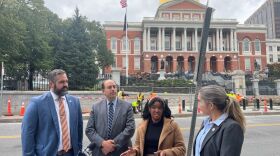Transportation is on the minds of residents as Massachusetts voters begin casting ballots.
Just before early voting opened in the state, MassINC released results in a survey that showed voters support fixing the current transportation system. Two-thirds of voters surveyed support improving highways, roads and bridges. Nearly as many supported improving the existing public transportation network.
Matt Murphy of the State House News Service says these results can give us an inkling into how certain candidates or even ballot questions might fare.
Matt Murphy, State House News Service: I think it shows that transportation is on the minds of voters as they're getting ready to vote this fall. And some have even started voting — early voting, of course, began on Saturday.
And one of the big questions that will be divided decided in November, the so-called "millionaire's tax," Question 1. And as voters think about this question, they're hearing that this money is supposed to be earmarked, set aside by the Legislature, for spending on transportation and education. So it could help inform those decisions that people think about the condition of the highways, the roads, or if they use public transit and want to see money go towards the MBTA to fix some of the problems there.
But I think it's also going to inform the debate when we get back into session, into the lawmaking business. And come January, when lawmakers are going to be forced to confront — as federal relief dollars dry up — how they're going to continue to fund priorities at the MBTA and across the transportation system. They're going to have to look at funding, and this is going to inform them on some of the areas where people want to see this money dedicated.
Carrie Healy, NEPM: There was an article in The Globe last week about G.E. and other companies downsizing their Boston offices due to job cuts in a turbulent economy and a reluctance to go back to the office by employees. I'm wondering, in terms of those prospective voters who wanted to improve public transit, how this is likely to play out in the next year or two. Would an overhaul of public transit create a commute that employees would return to those scaled-back offices for?
Well, it speaks to the competitiveness of the region, I think. There was that story you mentioned, but there's been some other stories in The Globe and other outlets, about business leaders being concerned about Massachusetts' standing vis a vis other states and whether or not the state's going to remain competitive, attracting businesses, employees and all of the many college graduates, if they're going to get them to stay here and take jobs here.
A functioning transit system, a public transit system around the greater Boston area, is an important selling point for the metro area. It's also important to downtown to move people around, to support the small businesses that create that kind of vibrant urban life that people want.
But as more and more are working from home, housing costs are going up. You're seeing workers kind of stay in their communities outside of the region, not commute as much. This poses a problem — not just for the transit system because they're losing fares while it's rebounded; they're not quite back to pre-pandemic levels — but people just aren't in the downtown areas populating the lunch spots and the local businesses.
So, this is a multi-pronged problem that leaders have started to look at. There's been several commissions to look at what the future of work is going to look like and what that means for downtowns. But this is going to be an ongoing issue that people are going to have to figure out the new reality.
Early voting did start over the weekend, but Secretary of State Bill Galvin does not expect a huge turnout this time. Why not?
Yeah, the secretary said it's a little too soon on Friday to make his final prediction on turnout, but he does not think that this election is going to rival the 2.75 million who turned out the last gubernatorial cycle in 2018. He thinks it's going to be more along the lines of the 2014 election.
A couple of things are going on here. One, the races, the statewide races, the big ones that generate the headlines and the interest — namely, governor, this cycle — there's not a lot of competition across the board, so that's going to potentially keep some people home.
The other thing Secretary Galvin mentioned was confusion among voters about the ballot questions. Some of these ballot questions are very technical. A lot of money has been poured in arguing both sides of each of these questions. And the secretary thinks that voter confusion may serve to keep voter turnout a little lower than we've seen perhaps in some recent past elections.









